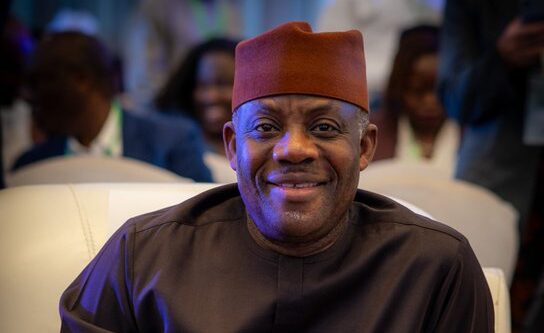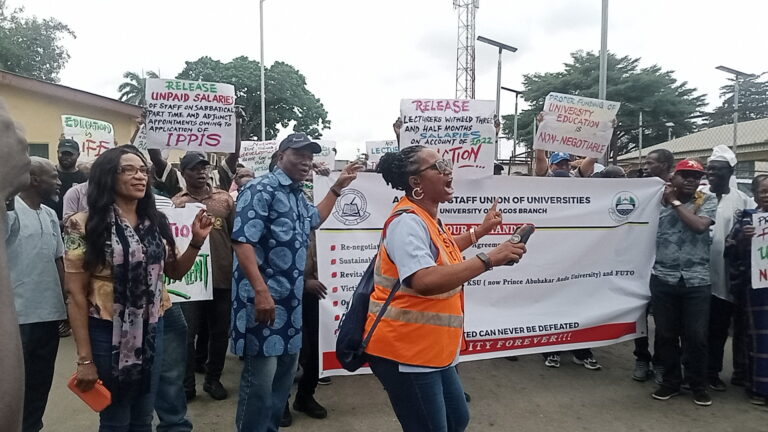At Thursday’s nationwide referendum conducted by ASUU, the union set a fresh ultimatum for the Nigerian government to sign the Yayale Ahmed-led committee’s report or face a “total and comprehensive strike.” DevReporting writes:
As earlier reported on Wednesday by DevReporting, members of the Academic Staff Union of Universities (ASUU) across various campuses nationwide filed out en masse on Thursday to participate in a referendum mandated by the union’s National Executive Council (NEC) on the failure of the Nigerian government to sign its renegotiated agreement.
Since 2017, when the former Education Minister, Adamu Adamu, inaugurated a committee led by Wale Babalakin, a Senior Advocate of Nigeria (SAN), to renegotiate the 2009 ASUU-FG agreement, which had been due for renegotiation since 2012, there has been no headway.
After Mr Babalakin was relieved of his appointment in 2020, three other committees were constituted by the government to complete the renegotiation, including the one currently led by the former Secretary to the Government of the Federation (SGF), Yayale Ahmed.
However, eight years after the renegotiation commenced, ASUU said there had been no tangible progress recorded, even as it accused the government of deliberately frustrating the efforts of its leadership and other stakeholders involved in the renegotiation since 2017.
Meanwhile, the new committee, led by Mr Ahmed, had reportedly submitted its report in December 2024, but ASUU said the government had abandoned it on the shelf, “gathering dust.”
Referendum

On 28 August, at a meeting with government representatives, led by the Minister of Education, Tunji Alausa, a medical doctor, there was no logical conclusion on the areas of disagreement as the government resolved to expand Mr Ahmed-led committee to include representatives of other workers’ unions in the university system, such as the Senior Staff Association of Nigerian Universities (SSANU), Non-Academic Staff Union of Universities and other Allied Institutions (NASU), among others.
The new position, according to the minister, was aimed at avoiding duplication of efforts, noting that most of the demands by other workers’ unions in the university system align with ASUU’s demands.
Worried by the latest development, ASUU called an emergency NEC meeting on Saturday, 6 September, and directed its branch chairmen to conduct a referendum across various campuses to either affirm or reject its proposal.
The branches therefore held the referendum on Thursday, where members appraised the report from the NEC meeting, and gave their verdict on three options listed before them as the next steps for the union.
Three options

Across various branches of the union monitored by our reporters nationwide, ASUU chairmen informed their congresses that the three-week grace period requested by the government would lapse on Thursday, 25 September.
At the expiration of the grace period, ASUU suggested that, should the government fail to adopt the Mr Ahmed-led committee report, the union should commence a “total indefinite strike,” or “a 14-day warning strike,” or “continue to negotiate” with the government.
As of Friday, 12 September, resolutions across various campuses, as obtained by DevReporting, indicated that members have directed NEC to declare a “total strike action” at any moment after 25 September.
One of the union leaders, who does not want to be quoted to avoid being sanctioned, told DevReporting that ASUU plans to catch the government unawares.
The source said: “Just to say that the congress, like other congresses, was piqued to note that an agreement that was due to be renegotiated since 2012 has become a subject of unnecessary politicking. Each successive government has been playing one game after another with the lives and livelihoods of Nigerian academics in the public universities and those of their students.
“It’s strange and shameful that Nigerian academics are the least paid in the world while politicians and other categories of public servants earn relatively better salaries. Nigerian lecturers are down already and do not care if their salaries are seized as usual while on strike.”
Following the resolutions already collated, across campuses, it is expected that ASUU would hold another emergency NEC meeting soon where these recommendations would be stamped and effected.
Govt’s position
After the ASUU meeting with the federal government on 28 August, the education minister, Mr Alausa, announced the efforts to address the union’s demands, even as he suggested that there was no existing agreement with ASUU until a counter proposal from the government to the committee’s report is addressed.
The minister’s comment created another round of hot debates, as the media reports suggested that the minister’s position indicated there was no existing agreement between the union and the government.
But the 2009 FGN-ASUU agreement was signed by the government with a caveat that it should be renegotiated at intervals to factor in new realities.
The attacks on the minister based on the media report informed the ministry’s decision to issue a statement clarifying the remark by Mr Alausa.
ALSO READ: This Nigerian graduate makes history in Law despite science background. Here’s how
Mr Alausa has consistently assured Nigerians that, under his watch, no union within the nation’s education sector would embark on a strike, saying President Bola Tinubu is committed to ensuring a peaceful atmosphere in the education sector.
But ASUU has also repeatedly urged Nigerians to ignore the minister’s optimism, saying there are no signs of the government’s commitment to averting the impending strike action.
DevReporting had earlier exclusively interviewed the union’s National President, Chris Piwuna, a Professor of Medicine at the University of Jos, Plateau State, who expressed ASUU’s frustration over what he described as the government’s delayed tactics in addressing its demands.
ALSO READ: ASUU president blows hot, says honeymoon with Tinubu-led govt over
ASUU’s demands
The union’s demands include renegotiation of the 2009 ASUU-FGN agreement, sustainable funding of Nigerian universities, revitalisation of the university system, payment of the outstanding 25-35 per cent salary arrears, and payment of accumulated unremitted third-party deductions from the members’ salaries, among others.
The union had engaged in massive media campaigns within the last four weeks to sensitise the public over its plight and sought interventions from eminent Nigerians to appeal to the government to avert the impending strike.

